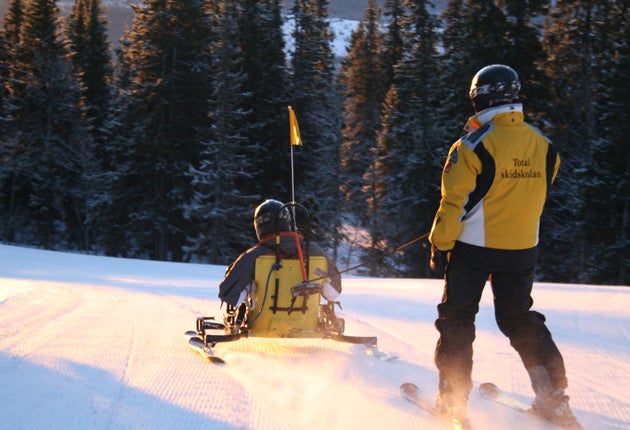All you need on the slopes is a bit of Back-Up
As the Winter Paralympics open in Vancouver, Colin Nicholson goes to Are, Sweden, where even serious spinal injury is no barrier

Tom is perched at the top of a piste, looking down apprehensively. And he has more reason than most to be apprehensive. This is his first day back on the slopes since he broke his neck doing tricks on a snowboard two years ago.
Yet his concern comes not from the fear of hurting himself. He is in an adapted kart in the resort of Are in Sweden, where the ski school specialises in courses for people with disabilities. "I'm just dreading seeing other snowboarders because I think I'll miss it so much," he tells me. But wasn't Tom also nervous about being back on the slopes? "Not really," he says. "That's partly helped by the fact I'm not in control of the vehicle – it's being controlled by someone far more sensible than me."
An instructor is tethered behind the karts of each of the five participants who have come to Sweden with nine volunteer buddies, nurses and carers on a course run by the Back-Up Trust, a charity specialising in activity holidays for the 40,000 or so people in the UK with spinal injuries. The course costs more than £2,000 per head to run. The trust suggests participants make a donation of £999, though carers and nurses are not required to donate, for the programme relies on their technical help with the "lifting and shifting" among other things. When the participants are at ski school, their helpers usually go skiing themselves.
Over the next few days, Tom, 25, hopes to learn to steer his kart with his shoulders, while fellow participants Louisa and Dominic have enough movement in their arms to steer their four-ski karts – although it is hard work. Louisa, 30, who was paralysed after suffering a spinal bleed, challenges Dominic to a race. How much control tetraplegics have over their upper body depends on where in the spine the break occurred. And while Louisa quickly learns to control her speed by carving turns down the slopes, for Dominic the effort involved is much greater and his instructor snowploughs and skids her turns to slow him down. "Beaten – by a girl," sighs Dominic, a 22-year-old Marine who was injured after celebrating the end of a training exercise in Norway a year ago.
Their aim is to learn to ski independently of an instructor. Dave, 42, and 10 years down the line from a diving injury, is taking a test to get the red licence that will allow him to ski independently on the intermediate red runs that make up about half Are's 70km of interlinked pistes that cover a vertical drop of almost a kilometre.
The karts weigh 30kg and although the pistes are uncrowded, they would pose a risk to other skiers if they ran out of control, so Dave must show he is able to get round a tightly spaced slalom course on a red run. It may seem a tall order, but as Dave explains it takes far less training than, say, a mundane chore such as learning to get out of bed in the morning, and the rewards are far greater.
"I'm really just interested in speed," he jokes, after hitting a couple of poles. But it transpires that one of his skis is jamming, so he will take the test again, and – untethered – skis freely down to the bottom of the drag lift, where his instructor hooks the kart on to the T-bar that takes everyone back up.
Glenn, 45, is taking his training one step further, using a sitski – a seat balanced over either one or two skis – and he must balance himself with two ski poles with small skis on the end. Although this requires more effort, it gives him much greater control on steeper slopes than the karts.
"Right, I'm ready for my first fall of the day," he tells his instructor, but, in fact, his modesty belies his ability and determination. Glenn skied six to eight weeks a year before he had an accident two years ago on a seemingly innocuous piste.The Back-Up Trust leads to many more possibilities for people like Glenn. Disability Snowsports trains skiers to compete right up to Paralympic standard, as well as taking them to events such as the Crystal Ski Fest, held every March, where skiers with disabilities can also race against able-bodied friends.
It's highly unusual that so many of this week's participants have had snow-related injuries. More than four-fifths of spinal injuries come from falls and road accidents, only 10 per cent can be termed sports injuries. And skiing, with three injuries per thousand skier days, is far less dangerous than football or rugby, sports which see about 10 and 20 times more injuries respectively.
The nature of their accidents does not seem to have put any of these participants off. "It's different from snowboarding," says Tom. "My stomach was still going up and down because I was so low to the ground that I couldn't see what's over the bumps. But just being on the slopes did it for me."
Glenn adds: "It's not that I've got anything to prove. I just love skiing."
Compact Facts
How to get there
Colin Nicholson joined the Back-Up Trust (backuptrust.org.uk) on its course in Are skistar.com/are). He flew with Scandinavian Airlines (0906 294 7767; flysas.co.uk), which offers flights to Trondheim Vaernes and Ostersund from £237 return.
Further information
Disability Snowsports (disability snowports.org.uk); Crystal Ski Fest (crystalski.co.uk/skichallenge); Swedish Tourist Board (visitsweden.com).
Join our commenting forum
Join thought-provoking conversations, follow other Independent readers and see their replies
Comments
Bookmark popover
Removed from bookmarks